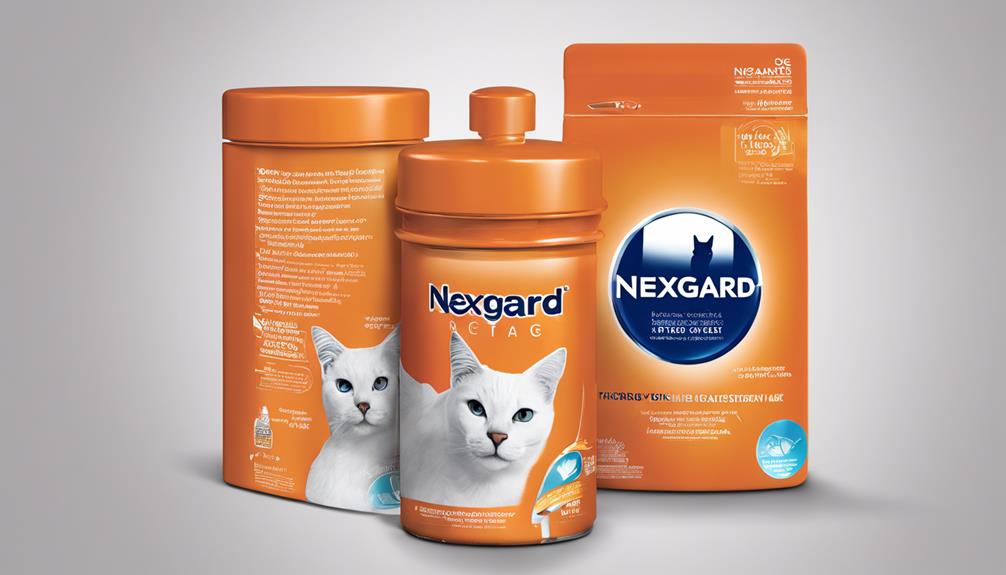Does Nexgard Kill Tapeworms
Nexgard kills tapeworms effectively by targeting fleas and ticks’ nervous systems. This disrupts tapeworm transmission. Preventing fleas with Nexgard reduces tapeworm risks. Afoxolaner in Nexgard kills tapeworms in pet intestines. Consult a vet before treatment. Consider pet weight and health for proper Nexgard dosage. Vets often prescribe monthly doses for other pests. Following instructions ensures the best tapeworm treatment. More details available for deeper insight.
Key Takeaways
- Nexgard kills adult tapeworms in pets’ intestines.
- Afoxolaner disrupts tapeworms indirectly by controlling fleas.
- Using Nexgard prevents tapeworm infestations by eliminating fleas.
- Consult a vet before using Nexgard for tapeworm treatment.
- Following vet’s instructions is crucial for effective tapeworm eradication.
How Nexgard Works Against Tapeworms
If you’re wondering how Nexgard works against tapeworms, it targets and eliminates these parasites effectively. The active ingredient in Nexgard, afoxolaner, disrupts the nervous system of fleas and ticks, ultimately leading to their death. Tapeworms, which are transmitted to dogs through the ingestion of infected fleas, are also affected by Nexgard due to this mechanism of action.
Once your dog ingests Nexgard, afoxolaner is rapidly absorbed into the bloodstream. When a flea or tick feeds on your dog’s blood, they take in the afoxolaner, which interferes with their nerve transmissions. This leads to hyperexcitation, paralysis, and eventually death of the parasite. Since tapeworms rely on fleas as intermediate hosts, by eliminating fleas with Nexgard, the risk of tapeworm infestations is greatly reduced.
Nexgards Effectiveness on Tapeworm Infestations
Nexgard effectively targets and eliminates tapeworms by disrupting their life cycle through the elimination of fleas, their intermediate hosts. Tapeworm infestations often occur due to the ingestion of infected fleas during grooming. Nexgard’s active ingredient, afoxolaner, not only kills fleas on your pet but also prevents new flea infestations. By breaking the flea-tapeworm cycle, Nexgard helps stop tapeworms from developing in your pet’s intestines.
When your pet ingests afoxolaner by taking Nexgard, it quickly reaches the bloodstream and starts killing fleas within hours. Once the fleas that carry tapeworm larvae are eliminated, the chances of your pet getting tapeworms decrease significantly. Regular use of Nexgard as directed by your veterinarian can help keep your pet free from tapeworm infestations. Remember, preventing fleas is key to preventing tapeworms, and Nexgard is a valuable tool in this battle.
Nexgards Impact on Tapeworm Larvae
Eliminating tapeworm larvae is crucial in preventing tapeworm infestations in your pet. Nexgard, a popular flea and tick treatment for dogs, can also have an impact on tapeworm larvae. While Nexgard isn’t specifically labeled to target tapeworms, its active ingredient, afoxolaner, works to kill fleas and ticks by overstimulating their nervous system, ultimately leading to their death.
Since tapeworms require fleas as intermediate hosts to infest your pet, by effectively controlling flea populations with Nexgard, you can indirectly reduce the risk of tapeworm infestations.
Tapeworm larvae can develop in your pet when they ingest infected fleas during grooming. By using Nexgard regularly as a preventive measure against fleas and ticks, you can help break the tapeworm life cycle and minimize the chances of your pet getting tapeworms. While Nexgard may not directly target tapeworms, its effectiveness in controlling flea populations plays a significant role in reducing the risk of tapeworm infestations in your furry companion.
Using Nexgard to Treat Tapeworms
Wondering how Nexgard can be utilized in treating tapeworms effectively in your pet? Nexgard, a popular oral flea and tick medication for dogs, contains a powerful ingredient called afoxolaner that not only targets fleas and ticks but can also help in the treatment of tapeworms. When your dog ingests Nexgard, the active ingredient is absorbed into their bloodstream and acts to kill adult tapeworms residing in their intestines. While Nexgard isn’t specifically labeled as a tapeworm treatment, its effectiveness against these parasites has been observed in many cases.
Using Nexgard to treat tapeworms is convenient for pet owners who are already administering this medication for flea and tick prevention. However, it’s essential to consult your veterinarian before using Nexgard specifically for tapeworm treatment. Your vet can provide guidance on the proper dosage and frequency needed to address tapeworm infestations effectively. Remember, Nexgard should always be used under veterinary supervision to ensure the health and well-being of your furry companion.
Nexgard Dosage for Tapeworm Eradication
When considering the dosage for eradicating tapeworms using Nexgard, it’s important to consult your veterinarian for guidance on the appropriate amount and frequency for effective treatment. Your vet will consider factors such as your pet’s weight, age, overall health, and the severity of the tapeworm infestation before determining the correct Nexgard dosage.
Typically, Nexgard is prescribed as a monthly chewable tablet for flea and tick prevention. However, when it comes to tapeworm eradication, the dosage may differ. Your veterinarian may recommend a specific dosage and duration of treatment to ensure that the tapeworms are completely eradicated from your pet’s system.
Following your vet’s instructions is crucial to the successful treatment of tapeworms. It’s important not to underdose or overdose your pet with Nexgard, as this can affect the treatment’s effectiveness and your pet’s well-being. By working closely with your veterinarian and following the recommended Nexgard dosage, you can help your pet get rid of tapeworms effectively and keep them healthy and happy.
Frequently Asked Questions
Can Nexgard Be Used as a Preventative Measure Against Tapeworms in Pets?
To prevent tapeworms in pets, Nexgard is not typically used as a preventative measure. It’s essential to consult with a veterinarian for the most appropriate tapeworm prevention methods for your pet’s specific needs.
Are There Any Known Side Effects of Using Nexgard to Treat Tapeworm Infestations?
When using Nexgard to treat tapeworm infestations, be aware of potential side effects such as vomiting, diarrhea, or lethargy. Consult your vet if you notice any unusual symptoms in your pet after administering the medication.
How Long Does It Typically Take for Nexgard to Completely Eliminate Tapeworms From a Pet’s System?
To fully eliminate tapeworms from your pet’s system, Nexgard typically takes about 2-4 weeks. Consistency is key in ensuring the complete eradication of tapeworms. Remember to follow the prescribed dosage and consult your vet for guidance.
Can Nexgard Be Used in Combination With Other Deworming Medications for a More Comprehensive Treatment Approach?
You can combine Nexgard with other deworming medications for a more comprehensive approach. Consult your vet to ensure the safety and effectiveness of the combination. It’s essential to follow dosing instructions and monitor your pet’s health closely.
Are There Any Specific Guidelines or Precautions Pet Owners Should Follow When Using Nexgard to Treat Tapeworms, Such as Diet Restrictions or Activity Limitations?
When using Nexgard to treat tapeworms, remember to follow vet instructions closely. Ensure proper dosage, monitor for side effects, and keep your pet on a regular deworming schedule. Maintain a healthy diet and encourage sufficient rest.
Conclusion
In conclusion, Nexgard can effectively kill tapeworms in dogs. By disrupting the nerve function of adult tapeworms and preventing the growth of larvae, Nexgard is a reliable option for treating tapeworm infestations.
It’s important to follow the recommended dosage for maximum effectiveness in eradicating tapeworms from your pet. Always consult with your veterinarian before starting any medication regimen for your furry friend’s health and well-being.








